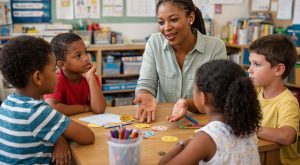See children as the very individual, very special beings that they are
The following words from Abraham-Hicks Publications inspired today’s article: “You are really individual beings, with very special talents, and it would be nice if teachers had the time, or parents had the awareness or skill, to see children as the very individual, very special beings that they are. So that, rather than trying to drum them into one category, they are, instead, appreciating the special insight that each child brings to the sea of diversity and contrast which is the stuff that creation comes from.”
 Creation thrives on diversity. The world is shaped and enriched by the variety of ideas, insights, and expressions each person brings. The way our vibrant ecosystem relies on biodiversity (meaning the variety of life on earth at all levels), human progress relies on the inclusion and celebration of all forms of talent and expression. Encouraging children to embrace their uniqueness, rather than conform to a single standard, encourages a culture of originality, empathy, and creativity. When we accept children as the very individual, very special beings that they are, and by valuing and nurturing the individuality of every child, we contribute to a more compassionate and dynamic world.
Creation thrives on diversity. The world is shaped and enriched by the variety of ideas, insights, and expressions each person brings. The way our vibrant ecosystem relies on biodiversity (meaning the variety of life on earth at all levels), human progress relies on the inclusion and celebration of all forms of talent and expression. Encouraging children to embrace their uniqueness, rather than conform to a single standard, encourages a culture of originality, empathy, and creativity. When we accept children as the very individual, very special beings that they are, and by valuing and nurturing the individuality of every child, we contribute to a more compassionate and dynamic world.
Every individual is a unique being, with a special set of talents, opinions, and capabilities that contribute to the richness of human diversity. This uniqueness is often overlooked in traditional educational and parenting methods, where children are often grouped into certain categories. We, at Capulum College aim at highlighting the importance of recognising the individuality of each child rather than fitting our learners into a singular mould. If teachers and parents had the time, awareness, and skills necessary to observe and nurture these individual qualities, the developmental experience would become far more empowering and enriching for children.
Each child brings its individual viewpoint and creative gift to the world, shaped by his/her own experiences, interests, and inborn gifts. By appreciating and accepting these differences, we can create environments where children feel valued for who they are, not for how well they fit into society’s norms. This personalised approach encourages self-confidence, curiosity, and a genuine love of learning. It also allows children to develop their talents in meaningful ways, leading to greater fulfilment and a better contribution to society, as they grow.
Unfortunately, the controls of modern education often demand conformity, standardisation, and measurable results, which do not support creativity and self-expression. Children’s success is most often evaluated by test marks or specific academic achievements, rather than seeing children as multilayered individuals with diverse strengths. This education system can overshadow the deeper qualities each child possesses, such as emotional intelligence, artistic creativity, empathy, or problem-solving abilities. True growth occurs when children are encouraged to explore their unique potential without fear of judgment or failure.
Parents, too, may unintentionally fall into patterns of comparison or expectation, focusing on milestones or society’s standards rather than embracing the natural differences in their children’s development. Awareness and skill are key in shifting this dynamic. By mindfully observing and supporting each child’s individuality, parents can help them develop a strong sense of self-worth and authenticity.










